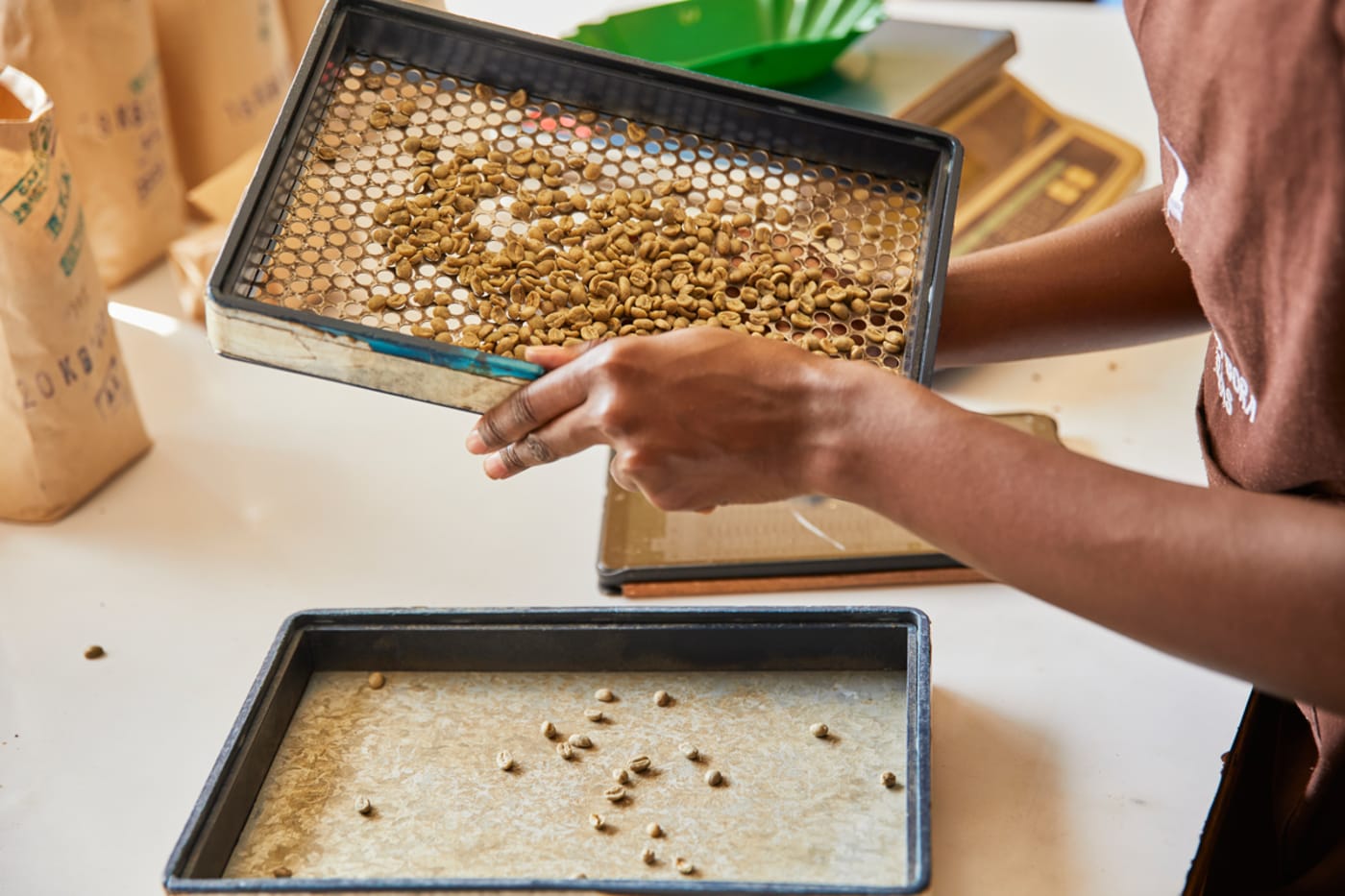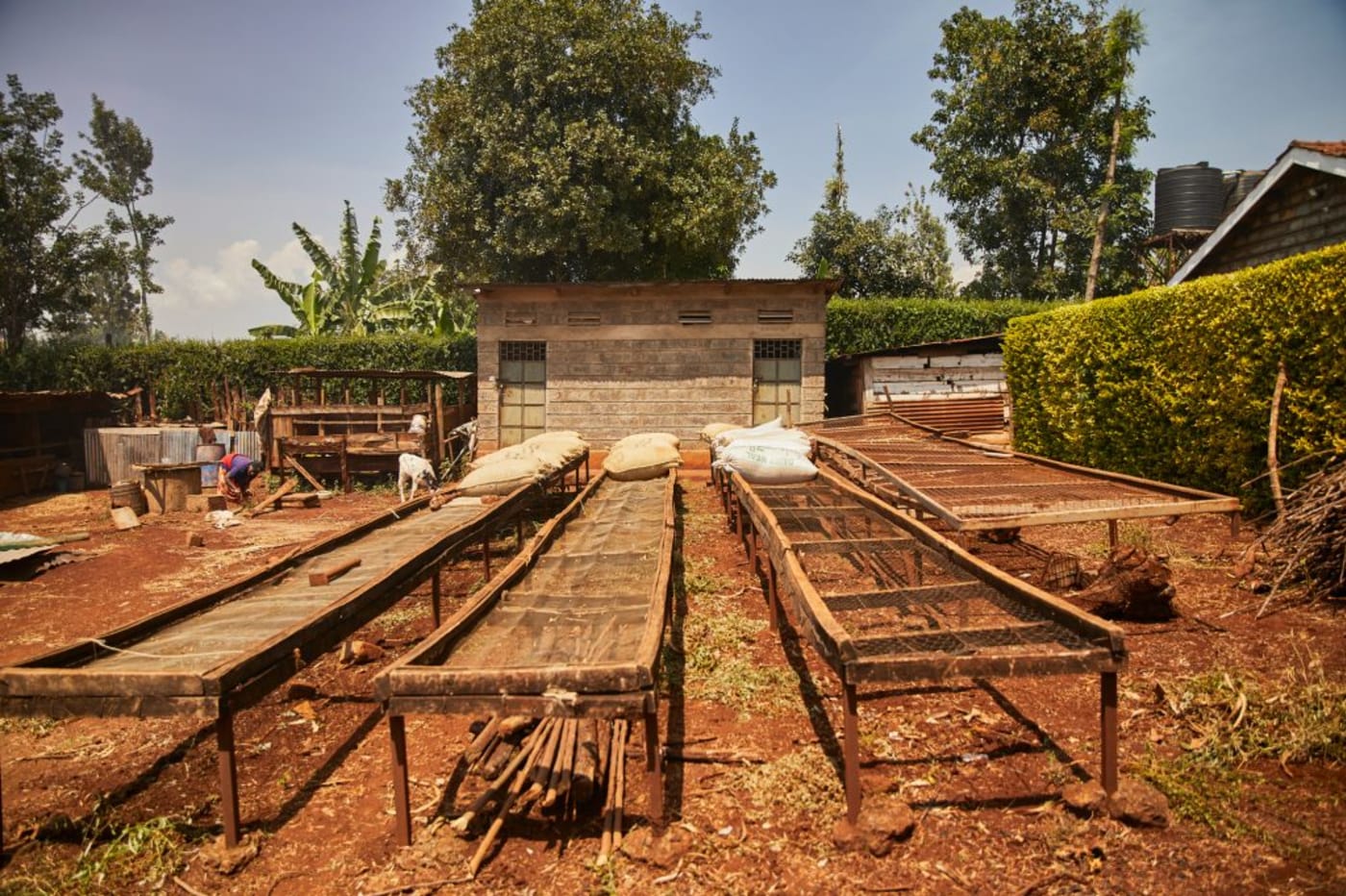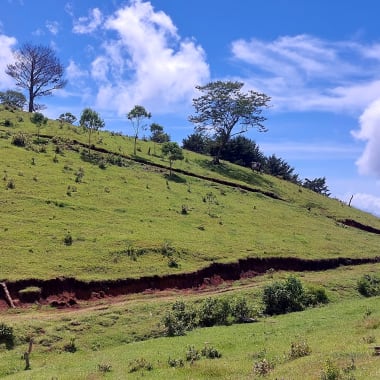-
Producer
-
~30 Smallholder Producers
-
Farm/Coop
-
Ngewa-Komothai Farmers
-
Country
- Kenya
-
Region
-
Kiambu County
-
Altitude
-
1,600-2,000 m above sea level
-
Varieties
-
Process
-
Harvested
-
January 2023
-
Importer
-
Melbourne Coffee Merchants
-
Body
-
-
Acidity
-
-
Tasting notes
-
Young raspberry, lime, peach
-
Roast style
Kenya
Komothai
Highly vibrant and subtle in flavours, this coffee has been carefully grown by ~30 farmers in the region of Ngewa-Komothai. It reminds us of young raspberry, lime, and peach.
A vibrant and light flavour profile with the full acidity you can expect from a traditional washed Kenyan coffee. However, it’s not your typical production approach!
This lot is made up of coffees that were grown and processed by around 30 independent producers who own coffee estates in the region of Ngewa-Komothai, located in Kiambu County, Central Kenya. Typically, the estates are around 2 hectares large and are comprised of a shamba (‘farm’ in Swahili) and small factory (the Kenyan term for a wet mill). They sit between an elevation of 1,600-2,000 meters above sea level in the foothills of the Gatamaiyo Forest Reserve and close to the Komothai river, a large expanse of relatively undisturbed rainforest in Kiambu County. The area is known for being home of the Kenyan Coffee Research Foundation.
The producers who contributed to this lot work together under the name “Ngewa-Komothai Farmers,” and are led by chairman James Ndichu Waweru. The farmers pick, pulp, ferment and dry their coffee crop independently, before their individual lots are blended as dried parchment at Kahawa Bora Mill, in Thika. Though not certified, many of the growers in the region follow organic practices, using only cow manure instead of agrochemicals to feed their coffee trees.

The practice of blending lots from small estates is an initiative started by our exporting partner, Kenyacof, and the team at their affiliated Kahawa Bora dry mill. Many quality-focused small estate owners have not produced enough parchment to meet minimum size requirements at dry mills. For years, this meant that small estate owners frequently ended up selling their parchment to agents who blend their coffee with many other lots, losing traceability and distinction in the process. To help small estate owners reach minimums, maintain traceability and ensure that blended lots uphold the quality of each contribution, Kenyacof facilitates grower groups by connecting small estate owners with others who are nearby and who achieve similar quality standards and profiles. This model also maximises the group’s opportunity to secure the highest price possible for their coffee crops.
These grower groups are more fluid than cooperatives and the exact number or contributing growers involved may change from year to year. However, the guiding principles of Ngewa-Komothai always remain the same – to assist small estate owners access more traceable dry milling and marketing solutions, to achieve better quality and higher prices for their coffees.
The members of the Ngewa-Komothai farmers group receive support from Sucastainability—a marketing agent that is on the ground directly helping them with training, education and support, and to secure fair prices for their milled coffee. Beyond this, Sucastainability connects the farmer group to specialty focused buyers (like MCM) that pay high premiums for exceptional quality.

This micro-lot is graded as an AA. This grade relates to the size (in this case, AA means that the beans are screen size 18 and above). More AA grade coffee is found in Central Kenya than anywhere else in the country, thanks to the high elevations which allow for greater late yields. These later yield cherries have the benefit of better weather, with optimum sunshine and a longer period for the sugars to develop and when they are finally picked, they are typically fuller, redder and heavier than cherries grown in other areas.
The coffee was then dry fermented for an average of 24 hours, to break down the sugars and remove the mucilage (sticky fruit covering) from the outside of the beans. Whilst the coffee was fermenting it was checked and when ready it was rinsed and removed from the tanks.
Using clean water from the nearby Komothai River, the parchment-covered coffee was then washed and graded in water channels, before being transferred to raised drying tables (also known as African Beds). During the drying stage, which takes up to two weeks, the coffee was turned constantly to ensure it is dried evenly, until it reaches 11–12% humidity. Producers received guidance when building their own raised tables, along with the support of Kenyacof’s field officers at every step of the processing.
After the coffee rested, farmers delivered their dry parchment to Kahawa Bora mill (meaning “good coffee mill”) in Thika, Kenya. Here, millworkers analysed the parchment to determine its quality and blended the individual lots together before processing them for export.
Learn everything about this coffee:
Ethical, traceable sourcing
This page has all the sourcing information (variety, process, region, story, importer, and more) that our importers share with us, and give us permission to use.
The transparency helps us talk confidently about the quality and background of our product, and it helps you know exactly what you’re buying.
Learn more:
Coffee page transparency legend
Our coffee philosophy
Our business approach
Fresh harvest coffee
We only source and roast coffee from each country’s latest harvest season (so the green coffee is never older than 1 year from the time of picking, processing and packing). This ensures the sensory qualities are always at their peak and unaffected by excessive ageing.
Roasted for espresso and filter (best enjoyed black)
Roast style: omni. Omni roasts are designed to brew and taste great both as espresso and filter. Our omni single origins generally sit on Agtron values in the ~70-60 value range. So, technically, they are somewhere in the lighter side of the medium spectrum.
Designed for espresso and filter brewing. Best enjoyed black.
Learn more:
Our Loring Kestrel S35 roaster
Our roasting style and approach
Best brewed within days 15-49 post-roast
The ‘fresh is best’ saying doesn’t apply to coffee (contrary to popular belief). Waiting before opening and brewing your bag of whole coffee beans helps develop peak flavour and acidity.
But heads up: if you buy pre-ground coffee, brew it as soon as possible.
Learn more:
Our recommended brewing window
Try our custom brewing recipes
Our recipes and ratios are tailored to our coffee sourcing and roasting styles, bringing the best flavour and feel out of each coffee.
For pour over, immersion, and other filter brewing styles, check our brew guides.
For our espresso single origins, we recommend a coffee:yield ratio of 1:3:
- Dose: 20g ground coffee
- Yield: 60g espresso
- Total brew time: ~24-28 seconds
This is just a starting point! We encourage you to experiment, taste, and adjust to find the recipe that you enjoy the most.
Learn more:
Our espresso brew guide (single origin)
Brewing ratio calculator
Packaging and sustainability
- Bags: ABA-certified home compostable (AS 5810-2010)
- Labels: recyclable
- Valves (only on +250g bags): general waste
- Box and tape (online orders): recyclable
Learn more:
Our packaging
Varieties
Batian variety
Batian is the latest variety to be developed in Kenya, it is named after the peak of Mount Kenya
Ruiru 11 variety
Released in 1985, Ruiru 11 is a disease resistant varietal developed in Kenya
SL28 variety
SL28 was developed in 1931 by Scott Laboratories to suit the growing conditions in Kenya. The varietal is known for its exceptional cup quality
SL34 variety
Developed by Scott Laboratories in Kenya, the SL34 varietal was designed to be high yielding with good cup quality.
The location
Coffee from Kenya
Alongside Ethiopia and Colombia, Kenya is one of the origins we get most excited about at the roastery. It exports some of the most vibrant, bright, and unique coffees in the world.
Farm processes
Washed process
Machines are used to remove the flesh from the coffee cherry before being fermented in water, washed again, and finally sun dried. This process tends to result in more distinct, cleaner flavours.

Subscribe to a world of coffee
Discover a new single origin coffee from Sample every 1-5 weeks with no delivery fees.
No up-front purchase, and you can pause, cancel, or change plans at any time.
Available to order online this week:

Ethiopia Tadese Teko
Flavours of bergamot, mandarin, mango
Body Acidity
Washed Ethiopian Heirloom
January 2025 harvest
Roasted omni for filter and espresso
Ethiopia Tadese Teko online
El Salvador Manuel Castañeda
Flavours of toffee apple, cranberry, dulce de leche
Body Acidity
Honey Pacamara
March 2025 harvest
Roasted omni for filter and espresso
El Salvador Manuel Castañeda online
Colombia Rigoberto Chavarro
Flavours of brown sugar, wine gum, candied stone fruit
Body Acidity
Washed Pink Bourbon
February 2025 harvest
Roasted omni for filter and espresso
Colombia Rigoberto Chavarro online
Kenya Karimikui
Flavours of blood orange, blackberry, plum jam
Body Acidity
Washed Batian, SL28, SL34, Ruiru 11
November 2024 harvest
Roasted omni for filter and espresso
Kenya Karimikui online